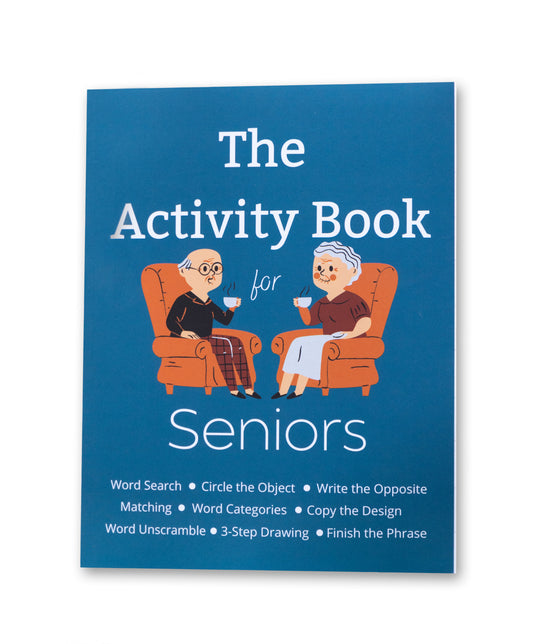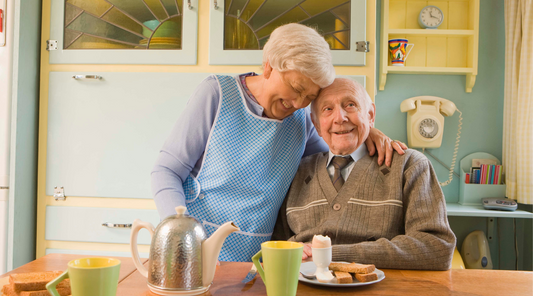
45 Purposeful Activities for Seniors with Dementia or Alzheimer's
Share
Creating Purpose to Help Seniors with Dementia
Everyone needs a sense of purpose; a reason to get out of bed each morning. This need doesn’t change as we age. When the years of meaningful employment, volunteering in the community, or taking care of family members have passed, a seniors' sense of purpose can come into question. When their own physical and mental abilities decline and they require more assistance from others to get by which can lead to them feeling as though they don’t have much of a purpose in life and are a burden to others. These factors can lead to depression. Depression can lead to withdrawal and not eating. Left unchecked, this can become a downward spiral as withdrawal, not eating, and lack of purpose set in.
Creating Purpose at Home and in Assisted Living
Seniors living independently in the community can have a purpose in maintaining their ability to live alone safely, making meals, cleaning, and doing their laundry. For those who can’t care for themselves and now live in a facility, those tasks are now being done by a worker and can take away some of their sense of purpose. A favorite patient of mine put it this way, “they do my laundry, cook my meals, make my bed, and clean my room. I have nothing left to do!” Although nursing homes and assisted living facilities have an important role in maintaining the well-being and safety of seniors, caregivers need to ensure seniors still have regular purposeful activity.
Why is it important for dementia patients to do activities?
As a caregiver, it is important to help foster your loved one’s sense of purpose. The key is to promote engagement, participation, and interaction. Look at their personal history of work, family, hobbies, and interests to find activities that will work for them. Consider their mental and physical limitations when trying to find things to engage them. If a task is too difficult, it becomes stressful rather than enjoyable. On the other extreme, when a task is too easy, it can be boring leading to a lack of engagement. Look for the barriers to their participation to see if things can be adjusted to work for them.
Can taking care of a pet help someone with dementia?
My mom, now in the moderately severe stage of dementia, has had a dog her entire life. She adopted her motorized dog, Sushi, a few months ago, which has been beneficial in triggering what is ingrained in her brain - taking care of a pet. She has been talking more and seems happier since adopting the dog. It can easily be seen in her demeanor that she feels responsible for the dog’s well-being and perks up when presented with the dog. Throughout the day she holds it, pets it, and talks to it. The dog gives her a sense of purpose, which to her is taking care of another living thing, a common purpose many people have. Another way I have recently engaged my mom is by asking her to “help me fold the laundry” as a way to give her the purpose of helping me out with housework. I deliberately pull out washcloths just for her to fold them and have a grateful attitude to her for her “help”. Everyone needs to be needed!
How to Adapt a Task to Dementia Patient's Ability Level
As dementia progresses, abilities decline, leading to a change in what they can participate in to give them purpose. It is essential to let them do what they can for themselves, and only take away what they can no longer do safely. Before you completely take a task away from them, first see if you can adapt the task so that they can still benefit from doing part of it themselves. For example, if they can still dress safely with extra time, it is best to have them do it on their own rather than you doing it for them more quickly. If they become frustrated, it’s good to provide the subtle assistance they need to help reduce frustration. You may have your loved one assist you with meal prep by stirring the ingredients in a bowl because that is the one part of the meal prep process where they can participate. As they assist you, focus on their success, rather than pointing out their errors. Their participation and engagement are more important than the quality of the outcome of the task.
6 Benefits of Creating a Sense of Purpose for those with Dementia
- Promote brain function
- Gives life meaning
- Reduce boredom
- Reduce problematic behaviors
- Combat depression
- Improve appetite
Below is a list of ways to engage a person with dementia, not all tasks will work with everyone. It is important to adapt the task to the person’s ability level.
45 Meaningful Daily Activities for Someone with Dementia/Alzheimer's
- Housekeeping tasks - dishes, laundry, meal prep, wiping counters
- Simple home repairs
- Volunteering in the community
- Assisting with childcare
- Caring for a pet
- Caring for a plant or fish
- Providing an audience to children’s sports, performances, music practice, etc...
- Listening to a child learning to read
- Sending out birthday cards to loved ones
- Calling friends and family to see how they are doing
- Independence with self-care tasks of dressing, bathing, grooming, toileting
- Sharing wisdom gained over the years and life story by writing it, or having it video recorded
- Have conversations with people you enjoy
- Engaging in a craft or art
- Giving the craft away as a gift
- Simple woodworking
- Striving for optimal health through eating and regular exercise
- Singing with others
- Listening to music they enjoy
- Sorting silverware
- Sorting coins
- Matching socks
- Simple games, especially familiar ones
- Word searches/ activity books
- Simple puzzles - aim for a low number of pieces and have the pieces be large
- Participating in meal prep
- Decorating cookies
- Wrapping a present
- Shopping
- Balloon batting
- Feeding self
- Rolling a ball on a table
- Having nails painted
- Hand massage
- Daily devotions
- Religious services
- Reading
- Birdwatching
- Knitting
- Play a musical instrument
- Enjoying visitors
- Enjoying nature
- Caring for a baby doll, or motorized pet
- Sorting cards
- Walking







1 comment
I long to do these things with my husband! However he has settled onto a very sedentary lifestyle and I s refusing to get up even with tons of encouragement! Any ideas?